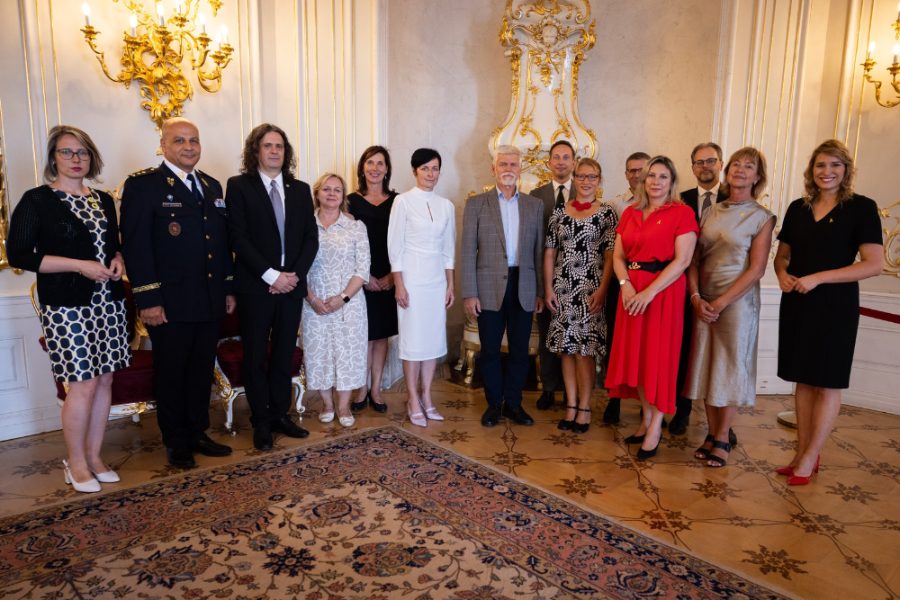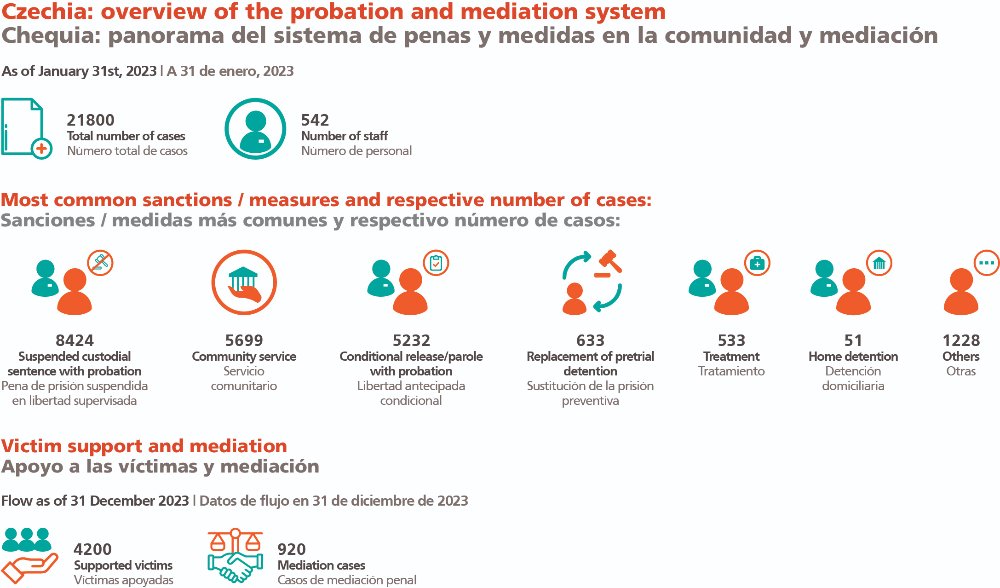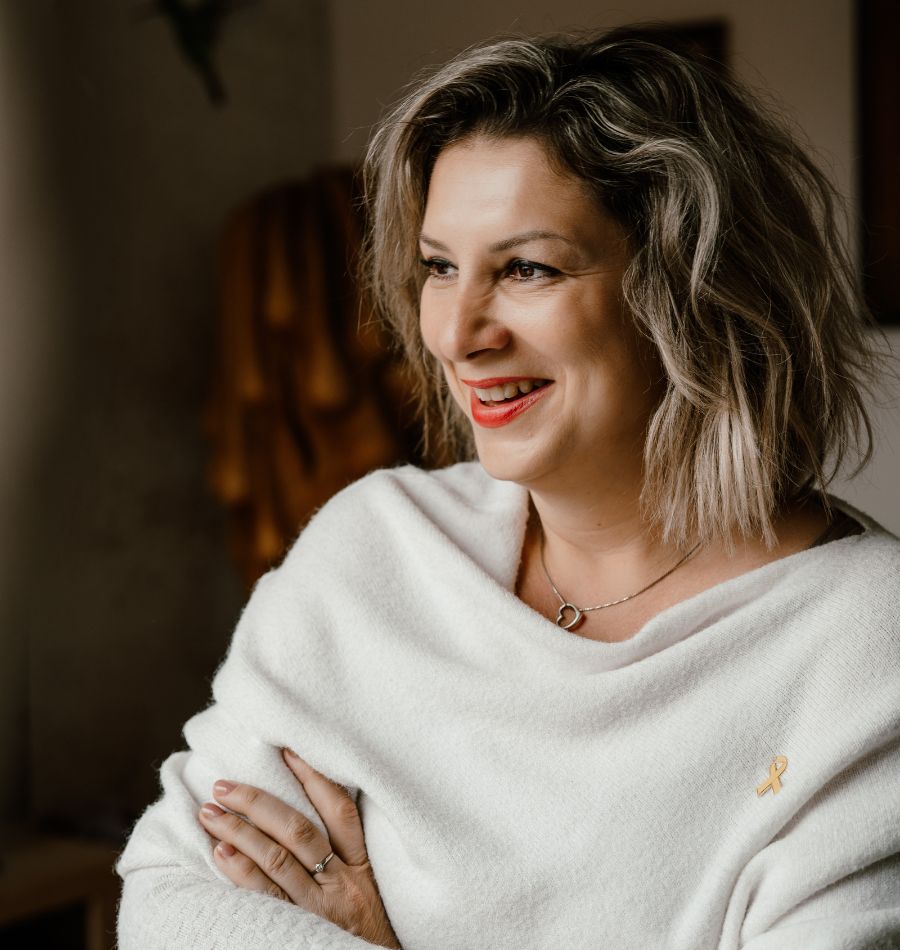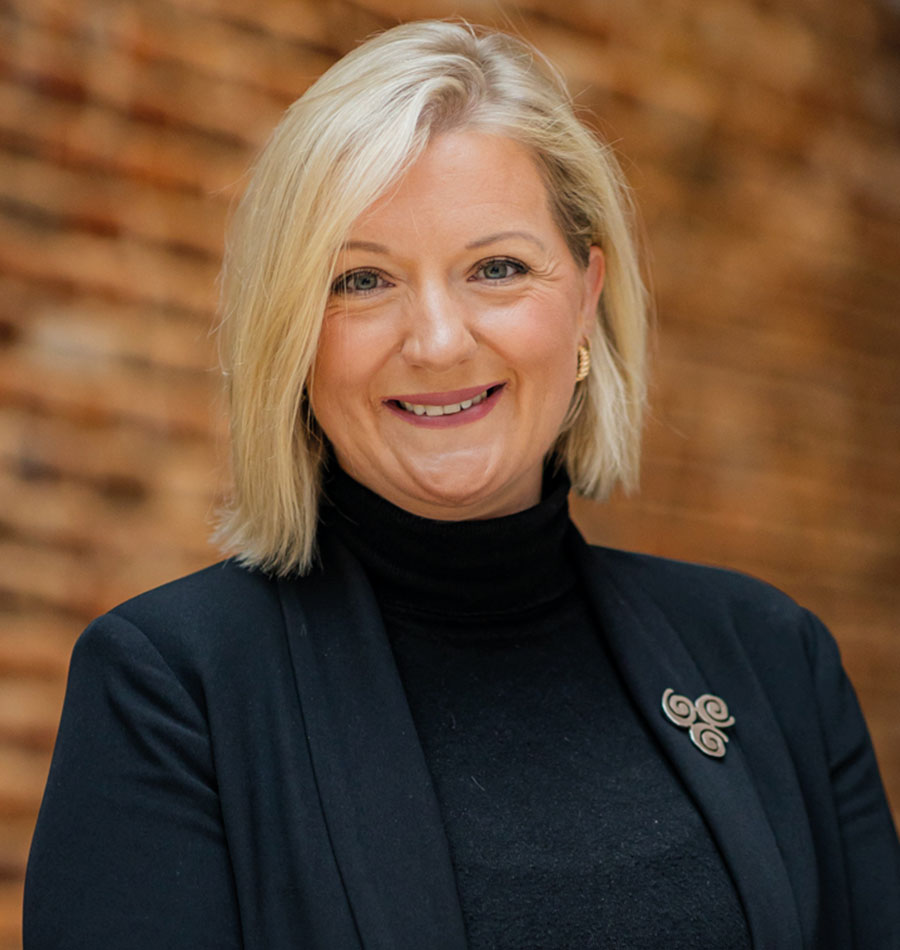Interview
Gabriela Slováková
Director General of the Probation and Mediation Service Czech Republic
Gabriela Slováková took up the role of Director General of the Czech Probation and Mediation Service in 2025, bringing with her over two decades of experience in prison leadership, criminal policy, and restorative justice. As founder of the Yellow Ribbon project in Czechia, she has long championed second chances and social reintegration. In this interview, she outlines her priorities for the service, reflects on current challenges, and shares her vision for a justice system that repairs rather than isolates.
Since your appointment as Director General, what headline goals
are guiding your leadership?
GS: The opportunity to manage the Probation and Mediation Service is not only a great personal honour, but also a professional highlight. I am aware of the responsibility and I accept it with respect, commitment and a deep belief in the mission of our Service.
The Probation and Mediation Service is in good shape, standing on a solid foundation, and is made up of experts and professionals of whom we can be justly proud. My goal is to build on this strength, foster team spirit and create a modern internal culture based on trust, open communication, respect and support for the professional growth of each team member. One of my main goals is also to raise public awareness of our work. The Service plays a key role in the delivery of criminal justice: contributing to safety, encouraging responsible behaviour of offenders and providing support to victims. I want the public to know more about this mission and for the work of our colleagues to get the recognition they deserve. I recently had the opportunity to serve as an expert patron in a roundtable hosted by the President of the Czech Republic in 2024. The President has long been interested in criminal policy and has supported expert discussion and positive changes toward more restorative approaches and individualised, meaningful sentencing that considers the best interests of victims and reduces the risk of recidivism for offenders. I believe that the Probation and Mediation Service is an important support and driver of positive changes in these areas.
An important milestone is the adoption of a new 10-year strategy, which we have worked on intensively and which should come into force in 2026. It focuses on strengthening our financial and staffing capacities and improving conditions for probation and mediation. We also aim to develop new restorative approaches and programmes, introduce new probation houses and programme centres, and expand the treatment and support offered to offenders. Another key part is to significantly widen our support for victims of crime.
Lastly, we want to increase public awareness through education and communication about our work. This strategy reflects policy developments and emphasises the human dimension while strengthening the role of our service in the criminal justice system.
To fulfil all this, we need to take a multi-agency and multi-disciplinary approach, working closely with partners in the justice and social sectors, the police and the non-profit sector.

JT: Restorative justice has been a hallmark of Czech probation practice, since its inception 25 years ago.
What recent innovations or programmes are pushing this approach forward?
GS: Restorative approach is a central pillar of our work.
We are expanding the scope for mediation between offenders and victims, including in cases of serious crime and within prisons. We are strengthening the organisation of restorative or family group conferences in our work with young people, and are working towards systemic changes in the application of restorative approaches throughout the criminal justice process. At the same time, we are building partnerships and providing support to other organisations that run restorative programmes. We also help train judges, prosecutors, and other professionals.
I am convinced that professional and public education is crucial in this area. Our common goal is to make sure that every offender and every victim knows that there is a restorative option, a path that can help restore broken relationships and contribute to a greater sense of safety.
It is essential to apply a restorative approach wherever possible: during criminal proceedings, in court, in prison, or even in schools.
The Probation and Mediation Service has the ambition to be a leader in this field: to educate, to support where the restorative approach is not yet known, and to be a stable and professional provider of restorative programmes.
PMS’s new digital infrastructure is designed to support long-term evaluation of its activities. What changed and how can these insights shape your decisions about the future of rehabilitation services?
GS: The new agenda information system has been running for a year and represents a significant shift towards a modern and data-driven approach to criminal justice. It unifies and streamlines our day-to-day work with clients and partners across the justice system, making it more efficient and transparent. Of course, introducing such a system is a big change for everyone involved. That is why we focus strongly on training, clear processes and practical support, so that all colleagues feel confident using it.
This system gives us better oversight of individual cases and workloads, supports real-time planning and evaluation, and strengthens information sharing with other criminal justice bodies.
In the medium term, it will allow us to better plan capacity, identify systemic weaknesses and make more informed decisions, with greater impact on safety, resocialisation and the protection of victims’ rights.

JT: You were the driving force behind bringing the Yellow Ribbon project to Czechia in 2015 and serve as its Director.
What role does the Yellow Ribbon project play today in shaping public attitudes and supporting rehabilitation in Czechia?
GS: Not everyone has the same starting line, family support, opportunities, or the will to fight addictions. And prison alone will not solve these problems. My motto, and indeed the Yellow Ribbon motto, is ‘the fewer offenders, the fewer victims.’ That is why we want to give second chances and break down prejudices. It’s one way to reduce repeat offending and make the world safer.
In the Czech Republic, we have long struggled with a high recidivism rate: up to 7 out of 10 people released from prison go back behind bars. We also have the fourth highest incarceration rate in the entire European Union, with over 20 000 people in prison and around 22 000 offender cases in the care of the Probation and Mediation Service. Czech penal policy is very repressive, yet we are one of the safest countries in the world.
The Yellow Ribbon Run is not just a sporting event, but a powerful expression of solidarity. Through my work with the International Corrections and Prisons Association (ICPA), I brought back from the Singapore conference the inspiration for a project to help break down prejudice against people with criminal histories, educate the public on the issue of prison punishment and contribute to crime prevention.
In 2015, with great support of our Singaporean colleagues, the first edition of the Yellow Ribbon Run was held, with 32 participants, both members of the public and people in prison. A unique collaboration was formed linking the Prison Service of the Czech Republic, the Probation and Mediation Service, the non-profit and business sectors.
In a T-shirt with a ribbon we are all equal, you can't tell who is who. That's the magic of understanding. Gradually, the run has become an annual symbol of second chances and hope for a return to society.
Even during the pandemic, we kept the Yellow Ribbon Run alive with virtual runs inside prisons. In recent years, the event has grown strongly. In 2023, over 600 people took part, and the following year more than 900 runners joined in. Well-known figures have supported it, and the project has expanded abroad. Thanks to the cooperation with the Norwegian Prison Service, Kim Ekhaugen and Norway Grants, the Yellow Ribbon Growing European Hub has been established in the Czech Republic, with Croatia and Lithuania joining the Hub, and other partners gradually joining in.
This year, the 10th anniversary edition was held under the motto ‘We Run for the Family’. This means not only the biological one, but also the Yellow ribbon family. Individuals currently serving sentences, people with criminal past, their families, justice professionals, NGOs, the public, experts, politicians and artists all met in the beautiful parks of Prague. The programme included children’s races, relays, easy walk concerts, workshops. In total, nearly 1,200 runners took part and 30 of the 35 Czech prisons were involved.
I believe that thanks to the Yellow Ribbon Run the Czech public understands that imposing meaningful punishment in the spirit of restorative principles benefits everyone. My dream is that the Yellow Ribbon and the Growing European initiative will become a symbol, and that when you see our logo you immediately associate with our theme.

What is your long-term vision for the probation and mediation service?
GS: Our vision starts with the new strategic plan for the next 10 years. A key principle of the vision for the probation and mediation system in 2035 is “Justice that does not isolate but restores”. It is built on three pillars: individual support for offenders, assistance for victims and restoring broken relationships in society. Every offender is given the chance to take responsibility and change their life. Every victim is listened to and has access to professional help and support. Each sentence is individualised and carried out in a way that makes sense.
By 2035, we want the Probation and Mediation Service to be available in every region of the country, trusted as an expert partner in criminal proceedings, and fully connected to communities and partner networks.
We want to use modern tools and digital technology, including AI implementation, but never losing the human dimension.
We want staff to be respected professionals with space to grow and develop expertise through training and shared practice.
Above all, in 2035, the Probation and Mediation Service will remain an institution that fosters confidence in justice by delivering it with humanity, professionalism and respect.
Gabriela Slováková
Director General of the Probation and Mediation Service Czech Republic
Gabriela Slováková is an experienced and recognised international expert in prison leadership, reintegration, restorative justice. She was a member of Board of Directors of ICPA, Chair of EuroPris’ expert group on Family Relations, and Co-founder of the Middle European Correctional Roundtable. She is a member of national advisory boards and working groups focused on criminal justice with a special focus on women offenders, families and children of prisoners. For 20 years, she held senior positions in the Czech Prison Service before becoming Director of Criminal Policy at the Ministry of Justice. Since April 2025, she has been the Director of the Probation and Mediation Service. She is also a founder of the Yellow Ribbon association.
Advertisement



